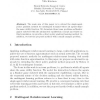704 search results - page 2 / 141 » Learning the Ideal Evaluation Function |
IJCAI
1989
13 years 7 months ago
1989
In real-world domains a concept to be learned may be unwieldy and the environment may be less than ideal. One combination of difficulties occurs if the concept is probabilistic an...
EUROCRYPT
2011
Springer
12 years 9 months ago
2011
Springer
We construct the first homomorphic signature scheme that is capable of evaluating multivariate polynomials on signed data. Given the public key and a signed data set, there is an...
MOC
2002
13 years 5 months ago
2002
Abstract. In this paper, we are interested in the evaluation of the zeta function of the simplest cubic field. We first introduce Siegel's formula for values of the zeta funct...
IDEAL
2004
Springer
13 years 11 months ago
2004
Springer
The main aim of this paper is to extend the single-agent policy gradient method for multiagent domains where all agents share the same utility function. We formulate these team pro...
KCAP
2009
ACM
14 years 8 days ago
2009
ACM
As computational learning agents move into domains that incur real costs (e.g., autonomous driving or financial investment), it will be necessary to learn good policies without n...



